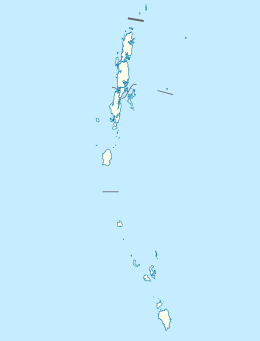Pulomilo
| Native name: Pilomillow, Pulo Milo | |
|---|---|
|
Location of Pulomilo Island in the Andaman and Nicobar Islands
|
|
| Geography | |
| Location | Bay of Bengal |
| Coordinates | 7°24′N 93°41′E / 7.4°N 93.69°ECoordinates: 7°24′N 93°41′E / 7.4°N 93.69°E |
| Archipelago | Nicobar Islands |
| Adjacent bodies of water | Indian Ocean |
| Total islands | 1 |
| Major islands |
|
| Area | 0.82 km2 (0.32 sq mi) |
| Length | 1.3 km (0.81 mi) |
| Width | 0.9 km (0.56 mi) |
| Coastline | 4.8 km (2.98 mi) |
| Highest elevation | 10 m (30 ft) |
| Administration | |
| District | Nicobar |
| Island group | Nicobar Islands |
| Subdivisions of India | Great Nicobar Subdivision |
| Taluk | Little Nicobar |
|
Largest settlement
|
Pulomilo
(population 20) |
| Demographics | |
| Demonym | Hindi |
| Population | 20 (2014) |
| Pop. density | 0 /km2 (0 /sq mi) |
| Ethnic groups | Hindu, Nicobarese |
| Additional information | |
| Time zone | |
| PIN | 744301 |
| Area code(s) | 03192 |
| Official website | www |
| ISO Code | IN-AN-00 |
| Literacy | 82.35% |
| Avg. summer temperature | 32.0 °C (89.6 °F) |
| Avg. winter temperature | 28.0 °C (82.4 °F) |
| Sex ratio | ♂/♀ |
| unit_pref | Metric |
| Census code | 35.638.0002.645140 |
| Official Languages |
Hindi, English, Tamil Car (regional) |
Pulomilo is an island in the Nicobar district of Andaman and Nicobar Islands, India, and home to a village of the same name. It is located just north of Little Nicobar Island,
Pulomilo was devastated by the 2004 Indian Ocean earthquake and tsunami. There were initial fears that the entire population had been drowned, but later reports showed that the island had been evacuated.
One-hundred five people were killed by the 2004 disaster on Pulomilo, representing 49.1% of the island's population. Of the 109 survivors, 15 (13.8%) had suffered an injury severe enough to be reportable and almost half (41 individuals) experienced diarrhoea, dysentery, fever, or a respiratory infection.
Besides the human losses, Pulomilo's economy and infrastructure were also devastated. Before the tsunami, Pulomilo residents enjoyed a few hours of electricity each night, and the village accommodated a small police post and radio house manned on a rotational basis. The tsunami swept away most structures on the island.
Not only were buildings shattered, but the tsunami also severely eroded the villagers ability to sustain themselves. It destroyed twenty-two of the islanders' outrigger canoes and eight boats, leaving only two embarkations in working order, and killed 823 livestock animals, including 239 pigs belonging to 25 families.
Pulomilo Island has a size of 0.82 km2 (0.32 sq mi). Before the 2004 Indian Ocean earthquake and tsunami, Pulomilo was connected to the Little Nicobar island. After the earthquake and tsunami, it became an island, as most of its land — except a small hilltop — was eroded or submerged. Most of the island is covered in forests of casaurina, pandanus and coconut-palm.
Pulomilo island belongs to the township of Great Nicobar of Little Nicobar Taluk.
...
Wikipedia

